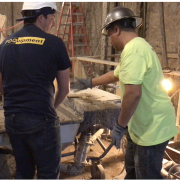Fireproofing Contractors for Commercial Builders
There are specific tools and materials that any Fireproofing Contractors for Commercial Builders cannot function without using them. In this article, we explore some; and highlight the pros and cons of others. But before we can dive in, let’s answer this question: is it important to use fireproofing materials?
The answer is a big YES. As a fireproofing contractor, you should use materials that are not only resistant to fire but safe for your employees as well. In the event of a fire accident, the escalation of flames should be minimized and brought under control.
As a contractor, you’ll have to follow Fireproofing Codes and Standards such as the Test Methods and Criteria for the Fire Resistance of Elements of Building Construction, Fireproofing Practices in Petroleum, Liquefied Petroleum Gas Code, and more. In other states, you may get penalized for not following some of those codes.
But there is a challenge for you: As there are few fireproofing material manufacturers, finding fireproofing products at an affordable price is often difficult. Most fireproofing suppliers charge ridiculous fees because they know it’s nearly impossible to replace them. That’s why it’s critical to ensure that whatever material you order for your client works very well.
Why is Fireproofing crucial to businesses and homeowners?
Today Fireproofing Contractors for Commercial Builders always consider fireproofing when they design a building. Be it a shopping center, an office block, or a residential home.
Generally, fireproofing keeps occupants safe and protects assets against being destroyed by raging flames. A property developer, for instance, may decide to add structural steel to a building, which will ultimately prevent valuable equipment from burning down.
Any Fireproofing Contractors for Commercial Builders worth his salt should use the following tools:
1. Fireproofing Spray
The fireproofing Spray will come in handy when you want to insulate certain building parts such as steel columns. While most contractors commonly use the sprays, experts warn against using fireproofing sprays on a daily basis. According to them, the contents of the spray can be quite hazardous. Apart from asbestos, fireproofing sprays are said to contain other potentially toxic materials. Inhaling them can cause chronic illnesses such as cancer.
2. Intumescent Paint
The second most crucial material you should have is Intumescent Paint. Most contractors go for this option as it is visually appealing. All you have to do is to mix chemicals that release vapors when exposed to extreme heat. When used in high concentrations, Intumescent paint may cause headaches, fatigue, dizziness, and nausea. Also, when people inhale droplets of pigment into the lungs, it may cause severe chemical pneumonia.
3. Concrete
Concrete is one of the best ways to protect a building against fire. Builders have used this method for years, and it proves to be helpful when it comes to reducing heat. You’ll have to pour it in place, either using columns or beams.
4. Aluminum
There is a good reason why most commercial property developers will expect you to use aluminum on window frames, doors, and roofing. It has enough tensile that makes it to be one of the most effective fire-resistant materials.
5. Asbestos Cement
Asbestos Cement is a combination of fibrous minerals with Portland cement, has a tremendous fire-resistive value. It has an impressive melting point of about 8710C, which means it can endure fire for longer than glass. What’s more, it is not likely to crack or swell in the event of a fire.
6. Gypsum
If you are a fireproofing contractor, and you are not using Gypsum, then you should consider it. When you apply it, your building will have a melting point of about 1000C to 1500C. Gypsum would prevent fire hazards from destroying the building, especially if you lay it underneath.
7. Terra-Cotta
Most people confuse Terra-Cotta with a standard brick as it looks like a brick. It is a clay product that comes with significant fire-resisting qualities than regular l bricks. However, expect to pay more.
8. Stucco plaster
Fireproofing contractors have using stucco plaster for thousands of years. What’s beneficial most about this material is that you can use it to cover steel, brick, wood, or just any structural material. It is 2.54 centimeter broad, which makes it a perfect fire-resistant material. Just make sure that you only assign this critical task to employees who are capable of applying plaster. This would be the addition to the durability of the stucco.
Remember, another aspect of a building that mitigates fire is the method of construction. After weighing all the cost implications, help your client with the technique to suit their pocket and protect occupants and assets. Find a durable fire-resistant material that will last clients for years. When done right, using the right fireproofing material can add to the property’s value as well. Your client will appreciate it, and before you know it, you will be getting tons of reviews from happy customers. Fireproofing contractors should always consider safety about everything else.




